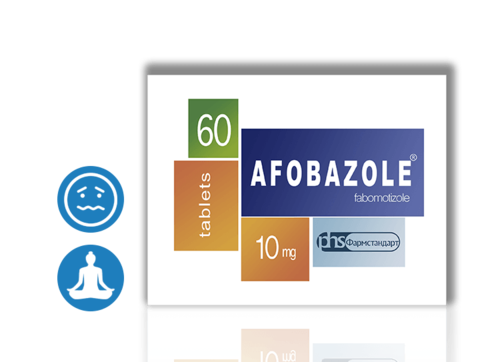International Non-Proprietary Name (INN): Fabomotizole
Dosage Form: pills (10 mg)
Structure: 1 capsule contains:
Active ingredient: Fabomotizole substance 10 mg;
Excipients: potato starch, microcrystalline cellulose, lactose, povidone, magnesium stearate.
Description:
Bevel-edged pills of flat-cylindrical shape in white or light cream color.
Pharmacological classification: anxiolytic
ATC code: N05BX
Pharmacological action: anxiolytic
AFOBAZOLE®
PHARMACODYNAMICS
Afobazole is a selective non-benzodiazepine anxiolytic. Acting on σ1-receptors in the brain nerve cells, Afobazole stabilizes GABA / benzodiazepine receptors and restores their sensitivity to endogenous mediators of inhibition. Afobazole also increases the bioenergetic potential of neurons and exerts neuroprotective properties (restores and protects nerve cells).
The effect of the drug is achieved mostly due to its combination of anxiolytic (anti-anxiety) and light stimulating (activating) effects. Afobazole reduces or eliminates anxious feelings (anxiety, bad forebodings and fears), irritability, tension (fearfulness, tearfulness, anxiety, inability to relax, insomnia and fear), depressive mood, somatic manifestations of anxiety (muscular, sensory, cardiovascular, respiratory and gastrointestinal symptoms), autonomic disorders (dry mouth, sweating and dizziness), cognitive disorders (difficulty concentrating and poor memory), including those arising from stress disorders (adjustment disorders). It is highly recommended to use the drug in people with mostly asthenic personality traits in the form of anxious suspicion, uncertainty, increased vulnerability and emotional lability as well as tendency to react emotionally under stress.
The effect of the drug develops on the 5th-7th day of treatment. The maximum effect is achieved by the end of the 4th week of treatment and remains after the end of treatment on average 1-2 weeks. Afobazole does not cause muscle weakness, drowsiness and does not have a negative effect on concentration of attention and memory. The drug does not have addictive properties or withdrawal syndrome.
PHARMACOKINETICS
Absorption: Afobazole is quickly absorbed from the digestive tract. Cmax in plasma – (0,13 ± 0,073) mcg / ml; Tmax – (0.85 ± 0.13) h.
Distribution: Afobazole is intensively distributed over well-vascularized organs: it is transferred rapidly from the central pool (blood plasma) to the peripheral pool (highly vascularized organs and tissues).
Metabolism: Afobazole pass firstly through the liver, the other main directions of metabolism are hydroxylation on the aromatic ring of the benzimidazole cycle and oxidation by the morpholino fragment.
Excretion: The half-life (T½) for oral administration is (0.82 ± 0.54) h. Short T½ is determined by the intensive biotransformation of the drug and rapid distribution from the blood plasma to the organs and tissues. The drug is excreted mainly in the form of metabolites and partially unchanged in urine and feces.
INTENDED USES
Generalized anxiety disorders, adjustment disorders, neurasthenia, sleep disorders associated with anxiety, neurocircular dystonia, alcohol and nicotine withdrawal symptoms, premenstrual syndrome as well as various somatic symptoms (bronchial asthma, irritable bowel syndrome, systemic lupus erythematosus, ischemic heart disease, hypertonic disease, arrhythmia, dermatological, oncology and other diseases).
CONTRAINDICATIONS
Hypersensitivity to the components of the drug (intolerance to galactose, lactase deficiency and glucose-galactose malabsorption), age below 18 years, pregnancy and lactation.
DOSAGE AND ADMINISTRATION
Afobazole should be taken orally with a small amount of water after meal. Do not dissolve or chew. The optimal dosage is 10 mg, thrice daily. Duration of the treatment course is 2-4 weeks. If necessary, the daily dosage may be increased up to 60 mg, and the duration of the course may be extended up to 3 months (on the doctor`s recommendation).
SIDE EFFECTS
Allergic reactions; occasional headaches (go away naturally and do not require the drug discontinuation).
Overdose:
Significant overdose and intoxication may lead to a sedative effect and increased drowsiness without effects of muscle relaxation. In such cases the emergency help is to inject 1 ml of 20% caffeine-benzoate sodium solution subcutaneously 2-3 times per day.
INTERACTION WITH OTHER DRUGS
Afobazole does not influence the narcotic effect of ethanol or the hypnotic effect of thiopental. The drug potentiates the anticonvulsant effect of carbamazepine and increases the anxiolytic effect of diazepam.
Pregnancy and lactation:
The use of Afobazole is contraindicated during pregnancy. If you need to take the drug during lactation, breastfeeding should be discontinued.
Influence on the ability to drive vehicles and operate mechanisms:
The drug does not negatively affect the ability to drive vehicles or to perform potentially hazardous activities which require increased attention concentration and quick psychomotor reactions.
Terms of release from pharmacy: without prescription.
Storage conditions: store in a dry dark place at temperatures no higher than 25°C. Keep out of reach of children.
Shelf life: 2 years. Do not use beyond the expiration date printed on the package.
Country of manufacture: Russia

